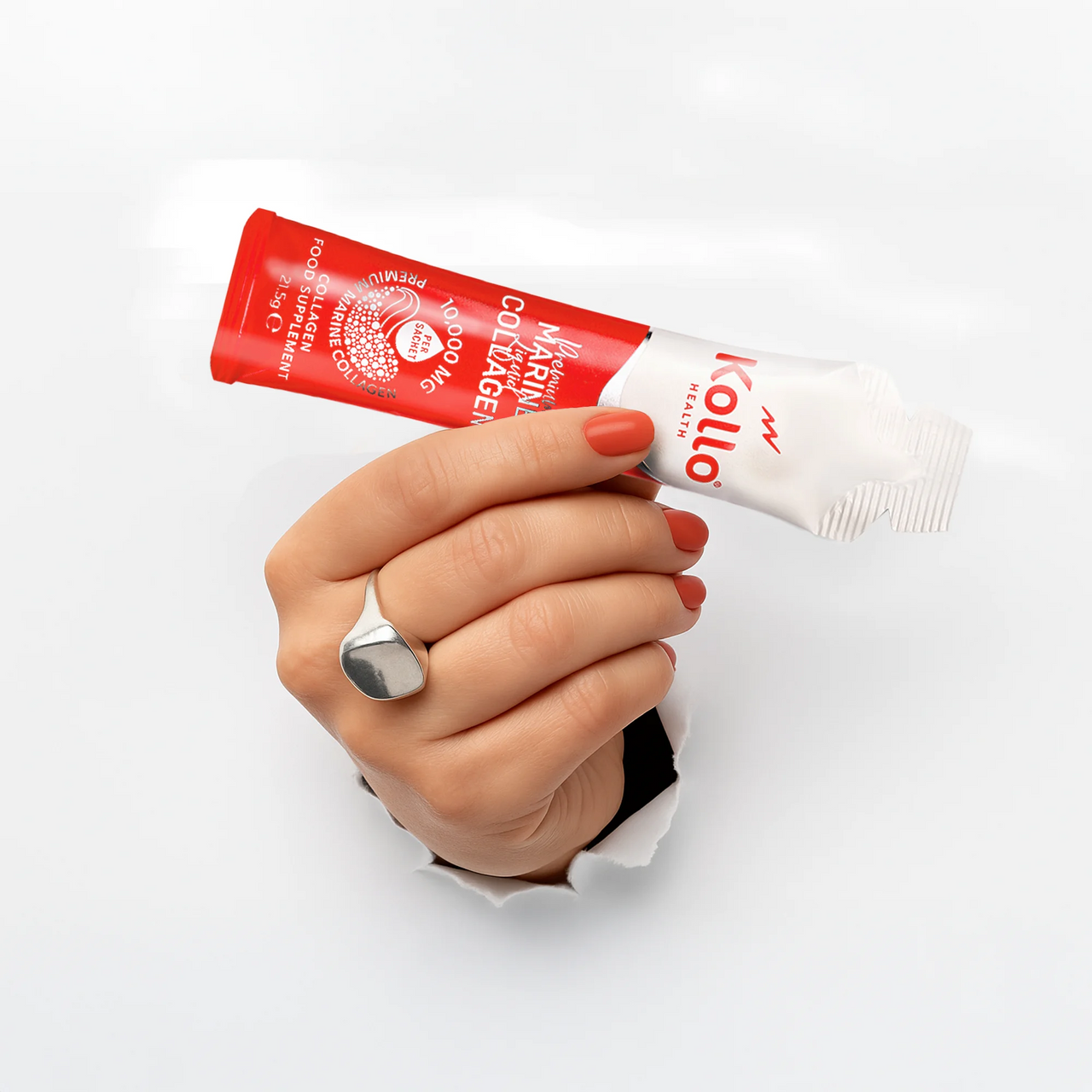With World Menopause Awareness Day taking place on 18th October, knowing the link between collagen and menopause is beneficial. In this blog post, we look at the potential benefits of taking liquid collagen supplements during menopause.
What Is Menopause?
Menopause is the end of menstrual cycles in women. It usually occurs anytime between the age of 45 and 55, but it is preceded by perimenopause, during which levels of the hormone oestrogen begin to decrease until the ovaries no longer produce eggs and periods cease completely. Menopause itself only occurs after a woman has had her last period.
Symptoms of perimenopause and menopause overlap, but they include:
- Irregular periods
- Mood fluctuations
- Breast tenderness
- Headaches
- Hot flushes and night sweats
- Vaginal dryness
- Reduction in volume and elasticity of the skin
- Loss of muscle tone and volume
During and after menopause, women are at an increased risk of certain health problems, such as compromised skin health, mental health problems, cardiovascular issues, and osteoporosis.
How Can Collagen Support the Body Through Perimenopause
The body's natural production of collagen reduces as we age, and it appears that collagen levels drop even more dramatically during perimenopause and menopause. Some evidence suggests that women lose about 30% of the collagen in their skin during the first five years after menopause, and continue to lose 2% each year thereafter for the next two decades.
With reduced collagen levels, skin becomes thinner, dryer, less firm, and more susceptible to sagging, lines and wrinkles. Additionally, diminished collagen levels contribute to muscle loss, bone density reduction, and hair thinning—all common concerns during this transitional period.
Taking collagen supplements throughout perimenopause and menopause can help maintain collagen levels in the body, supporting various aspects of health and well-being. Here are some key benefits of collagen supplementation during this time.
Improve Skin Elasticity
During menopause, many women find that their skin begins to sag and lose its youthful glow. Collagen supplements may counteract this concern by plumping the skin and protecting it from free radicals, which encourages skin radiance. Collagen may also help hydrate the skin, preventing the formation of deep wrinkles.
2. Enhance hair growth
Another common concern during menopause is lower hair density and the loss of hair shine. Collagen helps address hair thinning and hair loss by targeting follicle damage and releasing amino acids that build hair fibers. This promotes a healthier, shinier head of hair.
3. Support bone density
The theme of World Menopause Awareness Day in 2021 is bone health. Osteoporosis (a reduction in bone health and strength) can occur in both men and women as they age, but it appears that for women, bone health begins to decline much more sharply after the body stops producing oestrogen. Osteoporosis increases the risk of fracture when the bones come under pressure, such as during a fall.
During menopause, estrogen levels often drop sharply, leading to low bone density and an increased risk of osteoporosis later in life. Collagen helps support and strengthen bone cartilage, increasing mineral bone density and promoting pain-free joint movements.
Maintain Muscle Mass and Strength
Collagen plays a major role in muscle health. As we age and go through menopause, muscle mass naturally diminishes, partly due to declining collagen levels. Collagen peptide supplements can help maintain or improve muscle mass and strength, supporting overall physical health.
Enhance Gut Health
Marine collagen supports the integrity of the gastrointestinal tract while reducing inflammation. The amino acids glycine, proline, and glutamine, included in collagen supplements, maintain gut lining integrity and help prevent harmful substances from entering the bloodstream. Consistent use of collagen can boost gut health, reduce inflammation, and enhance nutrient absorption.
By incorporating collagen supplements into your daily routine during perimenopause and menopause, you can help counteract the natural decline in collagen levels, supporting your skin, hair, bones, muscles, and overall health. While collagen cannot completely halt the ageing process, it can significantly mitigate its effects, helping you maintain a healthier, more vibrant body throughout this transitional period and beyond.
Benefits of Liquid Collagen Supplements During Menopause
The average age a woman experiences menopause is 45-55. However, some women can go through premature menopause at a younger age. As menopause can affect women at different times, it is recommended to take supplements that support a naturally ageing body, such as liquid marine collagen, as soon as possible. This will help to combat and prevent the negative side effects of menopause before they have a chance to appear physically.
Get In Touch
Kollo Health’s Liquid Marine Collagen sachets could help to improve the body's natural collagen levels during perimenopause and menopause. Not only do they contain 10,000 mg of type 1 marine collagen peptides per dose, but they're also fortified with B vitamins and vitamin C, which can help to support skin, bone and brain health. Collagen supplements in liquid form have greater bioavailability than capsules or powders, which means they are more quickly absorbed by the body.
Learn more about Kollo Health’s Liquid Marine Collagen and the health benefits it could offer you.







